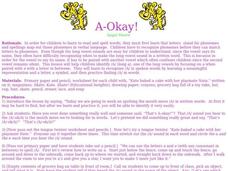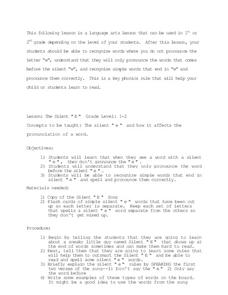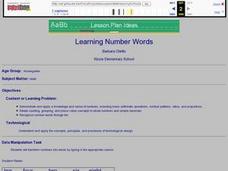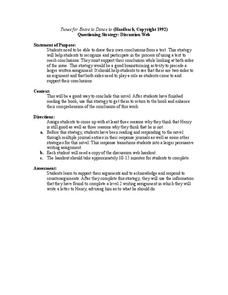Scholastic
Hopes and Dreams
A lesson encourages mini scholars in setting goals. Peers share their hopes and dreams and discuss how each one adds to everyone's unique character. Class members draw themselves in a scene achieving a goal. A follow-up meeting allows...
Scholastic
Selecting Favorite Poems From Historical Poets
Here is a poetry activity that begins with a free-association activity focused on the word voice. Learners each sit alone for a moment and make sounds that express how they are currently feeling, and then turn to their partners to share...
Curated OER
Bright Mice
Kindergarten through second graders explore the long i sound. For this phonics lesson, they read The Mother's Day Mice, sing "Farmer in the Dell," and play I Spy with long i in order to explore the target sound. Additionally, there is a...
Florida Center for Reading Research
Phonological Awareness: Rhyme, Rhyme Closed Sort
A rhyming activity challenges scholars to sort picture cards according to their rhyme. Four picture cards line up across the top of a pocket chart. Learners take turns choosing from a face-down stack of picture cards and sort them...
Computer Science Unplugged
Conversations with Computers—The Turing Test
Will the real computer please stand up? The premise of this activity is for the class to ask questions to a human and to a computer and to determine which is which. The class asks a given set of questions, and the person playing the role...
Star Date
Modeling the Night Sky
Dramatize the stars and planets as they become a visual representation of the solar system in this activity. Young astronomers track and simulate various constellations as they orbit the Earth to learn the position and motion of...
Florida Center for Reading Research
Phonological Awareness: Rhyme, Rhyme or No Rhyme
Rhyming is fun, builds phonemic awareness, and is a tried and true pre-reading skill. This activity helps learners identify words that rhyme. Young scholars listen to a song, locate a rhyming word they hear by clapping then draw a...
Curated OER
Star Wars: Rays and Angles Edition
Rays and angles and Star Wars? It sounds strange, but it's actually a fun game to help fourth graders get good at measuring and identifying angles and rays with a protractor. Each pair of children chooses which Star Wars character they'd...
Alabama Learning Exchange
Word a Day
Young scholars create a word bank of sight words. Each student creates his/her own personal word bank, and creates pictures to illustrate the word.
Curated OER
Picture Hunt: R Control O
Students use the r controlled o sound to sound out words and identify items and people in a picture. In this r controlled o lesson plan, students use the internet to complete their activity.
Curated OER
Reading in Preschool
Students read along with their parents to promote their own reading and fluency. In this reading lesson plan, students look at picture books and follow along with their finger.
Curated OER
Favorite Farm Animals
Students perform a study of farm animals and their babies. They compile a graph of their favorite farm animals. They utilize a spreadsheet worksheet which is imbedded in this plan.
Curated OER
A-Okay
Learners distinguish between short and long vowel /a/ sounds. They are introduced to the vowel-consonant-e pattern that changes short vowel sounds into long vowel sounds. Then they practice identifying words with the...
Curated OER
The Silent "E"
Students discover the silent "e". In this phonics lesson plan, students learn a song pertaining to the silent "e" sound and study pronouncing words that have the silent "e".
Curated OER
Lesson Plan 1: Practice Keyboarding Skills
The two lessons in this resource serve as an introduction to the keyboard and typing. While seated at a computer, pupils view an overhead display of the board and are introduced to the functions of the various keys. Designed for language...
Curated OER
Learning Number Words
Students practice saying their numbers and identifying the words. They use whole numbers and decimals to practice grouping numbers into different categories. They write the word of the number they are shown.
Curated OER
Kinzi Deaf Alumni
Students use data of school alumni to create a database. The lesson uses technology and access to a computer lab is essential. The concepts of graphing statistics is also used to help teach across the curriculum.
Alabama Learning Exchange
Phonics lesson for -ick family
Kindergarteners and first graders develop phonemic awareness for words that contain -ick. Each learner gets a stack of cards with different -ick words, highlighting the target sound as they review each one.
Curated OER
Sound It Out!
Help your class improve their spelling skills. Learners take a test, are given a particular spelling rule to practice, and play a Bingo game. This employs various methods for practicing spelling skills.
Curated OER
Volcanoes A-Z
Students examine terminology related to the study of volcanoes, geology, or the ecosystems that surround them. They make note of key words while reading exhibits, interpretive signs, or labels, or hearing them from each other, their...
Curated OER
Holidays Around the World
Students explore how different holiday traditions are celebrated around the world. Scholars write a paper describing how they celebrate their own favorite holiday. Email partners, from different states and countries, share their...
Curated OER
Dear Sassy Successful Student
Fifth graders identify the people who are responsible for their success and their current studying skills. In groups, they brainstorm helpful studying strategies and develop a creative way to share it with the class. To end the lesson,...
Curated OER
Alexander and the Terrible, Horrible, No-Good, Very Bad Day
Second graders interact with the story of Alexander's horrible day by connecting it to their lives. They practice predicting, writing paragraphs, reading aloud, discussing his problems, making a card to cheer him up, and designing a pair...
Curated OER
Tunes for Bears to Dance to: Questioning Strategy, Discussion Web
Readers of Robert Cormier's Tunes for Bears to Dance to are asked to consider the morality of the central character's actions






















